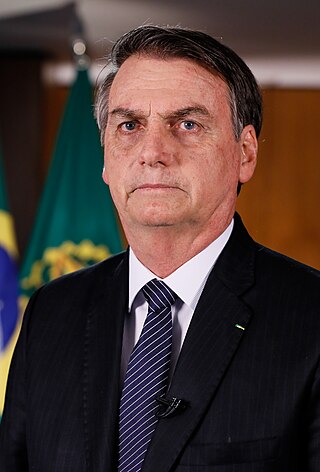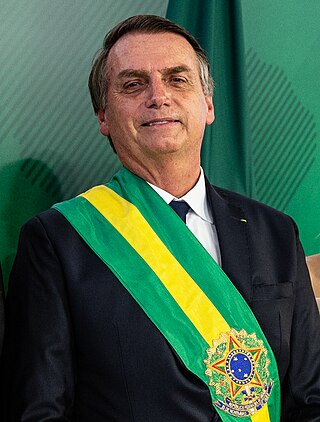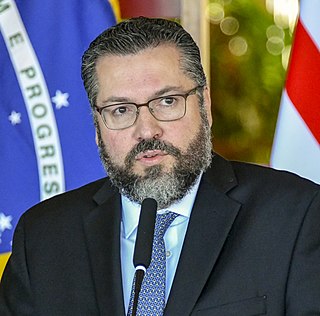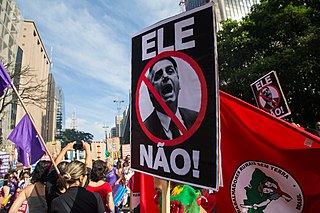
The Liberal Party is a conservative liberal political party in Brazil. From its foundation in 2006 until 2019, it was called the Party of the Republic.
Patriota, abbreviated PATRI and formerly known as the National Ecological Party, is a right-wing to far-right political party in Brazil. It was registered in the Superior Electoral Court in the summer of 2012. The President of the party is the former State Deputy of São Paulo Adilson Barroso, who before creating PEN was a member of the Social Christian Party. The party's Superior Electoral Court identification number is 51.

Jorge Antônio de Oliveira Francisco is a Brazilian lawyer and retired military police officer. He is the current Secretary-General of the Presidency of the Republic. On 20 October 2020, Jorge Oliveira was confirmed by the Federal Senate to the Federal Court of Accounts, succeeding minister José Múcio, who retired on 31 December.

Jair Messias Bolsonaro is a Brazilian politician and retired military officer who served as the 38th president of Brazil from 2019 until 2022. He was elected in 2018 as a member of the Social Liberal Party, which he turned into a conservative party before cutting ties with it. In 2021, he joined the conservative Liberal Party. From 1991 to 2018, Bolsonaro served in Brazil's Chamber of Deputies, representing the state of Rio de Janeiro.

Sergio Fernando Moro is a Brazilian jurist, former federal judge, college professor and politician. He was elected to be a member of the Federal Senate for Paraná in October 2022. In 2015 he gained national attention as one of the lead judges in Operation Car Wash, a criminal investigation into a high-profile corruption and bribery scandal involving government officials and business executives. Moro was also Minister of Justice and Public Security under the presidency of Jair Bolsonaro from 2019 to 2020.

General elections were held in Brazil on 7 October 2018 to elect the president, National Congress and state governors. As no candidate in the presidential election received more than 50% of the vote in the first round, a runoff round was held on 28 October.

Antônio Hamilton Martins Mourão is a Brazilian politician and retired military officer who served as the 25th vice president of Brazil from 2019 to 2022.

Eduardo Nantes Bolsonaro is a Brazilian politician, lawyer and federal police officer. He is the third child of Jair Bolsonaro, the 38th president of Brazil.

The 2018 presidential campaign of Jair Bolsonaro was announced on 3 March 2016. Brazilian federal deputy and former military officer Jair Bolsonaro became the official nominee of the Social Liberal Party during their convention on 22 July 2018. The running mate decision came later on 8 August, when General Hamilton Mourão was chosen to compose the ticket with Bolsonaro. By choosing Mourão as running mate Bolsonaro secured a coalition with the Brazilian Labour Renewal Party.

The presidency of Jair Bolsonaro started on January 1, 2019, when he was inaugurated as the 38th president of Brazil, and ended on December 31, 2022, with the inauguration of the cabinet of Lula da Silva III on January 1, 2023. He was elected the president of Brazil on October 28, 2018, by obtaining 55.1% of the valid votes in the 2018 Brazilian general election, defeating Fernando Haddad. On October 30, 2022, Bolsonaro was defeated by Lula da Silva. In the years Brazil has been a democracy since 1985, Bolsonaro became the first president to lose an election as an incumbent.

Michelle de Paula Firmo Reinaldo Bolsonaro is a former First Lady of Brazil from 2019 to 2022, being the third wife of the 38th President of Brazil, Jair Bolsonaro.

Ernesto Henrique Fraga Araújo is a Brazilian diplomat and Brazil's former Minister of Foreign Affairs. Chosen by Brazil's president Jair Bolsonaro in January 2019 following a suggestion made by Olavo de Carvalho, Araújo subscribes to theories such as man-made climate change is untrue and a "communist plot", "globalism" is a process driven by "cultural Marxism", and the COVID-19 (Coronarivus) pandemic is the result of another communist plot he dubbed "comunavirus".

Opinion polling has been regularly conducted in Brazil since the start of Jair Bolsonaro's four-year term administration, gauging public support for the President of Brazil and his government. Typically, an approval rating is based on responses to a poll in which a sample of people are asked to evaluate the overall administration of the current president. Participants might also be asked whether they approve of the way president handles his job, if they trust him, to rate his personality, or to opine on various policies promoted by the government.

The #EleNãomovement, also known as the protests against Jair Bolsonaro, were demonstrations led by women which took place in several regions of Brazil and, with less intensity, in other countries. The main goal was to protest against Jair Bolsonaro and his presidential campaign. The protests, which occurred on September 29, 2018, were the most numerous protests by women in Brazil and the largest popular concentration during the 2018 Brazilian general election.

André Luiz de Almeida Mendonça is a Brazilian attorney, Presbyterian pastor, and politician currently serving as Justice of the Supreme Federal Court. He is the third evangelical Christian positioned to join the top court, and former Minister of Justice and Public Security and Attorney General of the Union in the administration of President Jair Bolsonaro. Prior to assuming this role, he served as Attorney General of Brazil in the same administration.

The COVID-19 pandemic in Brazil has resulted in 37,625,916 confirmed cases of COVID-19 and 703,291 deaths. The virus was confirmed to have spread to Brazil on 25 February 2020, when a man from São Paulo who had traveled to Italy tested positive for the virus. The disease had spread to every federative unit of Brazil by 21 March. On 19 June 2020, the country reported its one millionth case and nearly 49,000 reported deaths. One estimate of under-reporting was 22.62% of total reported COVID-19 mortality in 2020.

Bolsominion is a pejorative term used by opponents of former Brazilian President Jair Bolsonaro to refer to a segment of his supporters. The word is an amalgamation combining the first half of the surname Bolsonaro, and the word minion, which is also the name of the characters in the Despicable Me franchise. The term gained prominence in Brazilian media with the rise of Bolsonaro throughout his 2018 presidential campaign.

Gilson Machado Guimarães Neto, commonly known as Gilson Machado Neto, is a Brazilian entrepreneur, politician and was the Minister of Tourism under the government of Jair Bolsonaro.
Auxílio Brasil was the social welfare program of the Government of Brazil, created during the presidency of Jair Bolsonaro. Announced in October 2021, the provisional measure was sanctioned by Bolsonaro after passing through both legislative houses on 30 December 2021, replacing Bolsa Família. However, after Lula's reelection as president of Brazil in 2022, he declared that he would rename the program to Bolsa Família, putting an end to Auxílio Brasil.
















